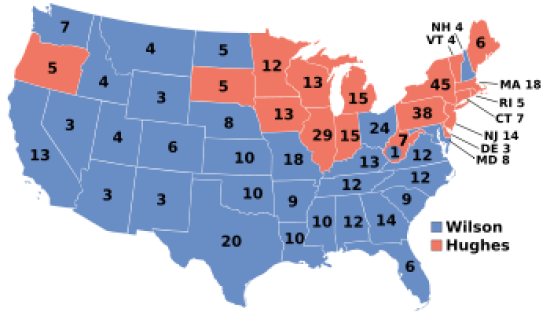One hundred years ago the United States went through a presidential election that was hard fought and narrowly decided. Woodrow Wilson, the only Democrat elected President since the Civil War, except for the two terms of Grover Cleveland, largely owed his election in 1912 to the Republican schism that caused Theodore Roosevelt to run as the candidate of the Progressive (Bull Moose) Party, winning more votes than the Republican candidate President William Howard Taft, and ensuring victory for the Democrats.
The Republican Party standard bearer, Charles Evans Hughes, resigned from the Supreme Court to run. A moderate, Hughes mollified and unified the Republican Party conservative and progressive factions. This was underlined when Theodore Roosevelt declined the nomination of the Progressive Party, announcing his support for Hughes. Wilson now faced a united Republican party.
The Democrats, ironically in light of subsequent developments centered their campaign around the slogan, “He kept us out of war.” Hughes barnstormed the nation, as did Theodore Roosevelt who tirelessly campaigned for Hughes. Hughes attacked increasing business regulation by the Wilson administration as an infringement on traditional American freedom.
Ultimately Wilson won on November 7, 1916, with a popular vote margin of 600,000 out of 17 and a half million votes cast, and an electoral vote count of 277-254. 266 electoral college votes were needed to win and the election was decided by California’s 13 electoral votes, which took several days to count, keeping the nation in suspense. Less than four thousand votes, out of almost a million cast, constituted Wilson’s victory margin over Hughes.
The Democrats kept control of Congress, although only by the barest of margins in the House where the Republicans made substantial gains.
The President who “kept us out of war”, would quickly find himself a wartime president. Immensely popular after the victorious conclusion of the War, he would live to see his League of Nations treaty rejected by the Senate, and his party swept from power in 1920. Wilson suffered a severe stroke on October 2, 1919, which was kept hidden from the public, his wife in effect serving as acting President for the remainder of his term with Wilson being severely disabled as a result of the stroke.
Charles Evans Hughes was appointed by President Hoover as Chief Justice, serving from 1930 to 1941, the public office he had always longed for.


What? Typo?
Thanks Nate for catching that. Correction made.
Nate,
I think Donald meant to say “League of Nations [rejected] by the nation”.
The USA did not join the League. Some historical speculation has concluded that if the USA had joined the League, the organization would have had the clout to stunt Hitler and Germany’s rise to power, possibly preempting World War II. Of course, that’s just speculation.